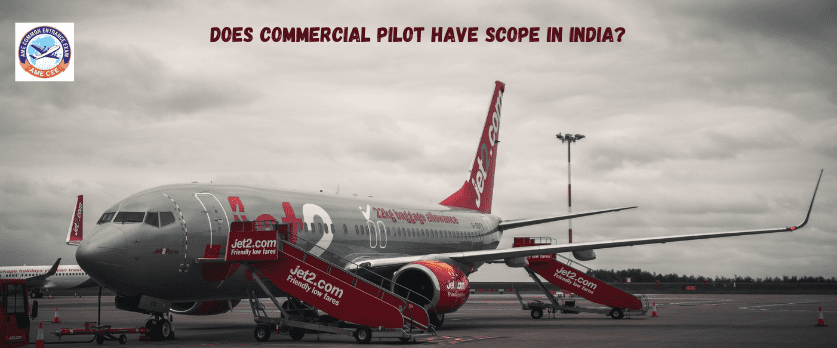Yes, there is a significant scope for commercial pilots in India. The aviation industry in India has been experiencing substantial growth in recent years, leading to increased demand for skilled pilots. Several factors contribute to the positive outlook for commercial pilots in India:
Growing Aviation Industry
The aviation sector in India has been expanding rapidly, with an increasing number of domestic and international airlines operating in the country. This growth has resulted in a higher demand for qualified pilots.
Airline Fleet Expansion
Many airlines in India are continuously expanding their fleets to meet the rising demand for air travel. This expansion requires a larger pool of pilots to operate and manage the increasing number of aircraft.
Regional Connectivity
Government initiatives and policies aimed at enhancing regional connectivity have led to the development of new airports and routes. This has further fueled the demand for pilots, especially those with the skills to operate smaller regional aircraft.
Pilot Retirement
As experienced pilots retire, there is a need to fill these vacancies with new, qualified pilots. This creates opportunities for aspiring commercial pilots to enter the industry.
International Opportunities
Indian commercial pilots also have opportunities to work for international airlines. Many Indian pilots are sought after by airlines around the world, contributing to the global demand for aviation professionals.
Training Infrastructure
India has established quality pilot training institutions that produce skilled and competent pilots. These institutions play a crucial role in supplying the industry with well-trained professionals.
Technological Advancements
Advancements in aviation technology require pilots with up-to-date skills and knowledge. This demand for technologically proficient pilots contributes to the ongoing need for trained professionals in the field.
Government Initiatives
The Indian government has introduced initiatives to promote the aviation sector, such as the Regional Connectivity Scheme (UDAN), which aims to enhance air connectivity to underserved and remote areas, creating additional demand for pilots.
While the outlook for commercial pilots in India is positive, it’s important for aspiring pilots to undergo rigorous training, obtain the necessary licenses, and stay informed about industry trends. Additionally, the aviation industry can be influenced by external factors, such as economic conditions and global events, which may impact job opportunities.
FAQs on the Scope of Commercial Pilot in India
Q1. Is there a demand for commercial pilots in India?
A. Yes, there is a significant demand for commercial pilots in India due to the growth of the aviation industry and the expansion of airline fleets.
Q2. What is driving the demand for commercial pilots in the country?
A. Factors such as the increasing number of airlines, fleet expansion, regional connectivity initiatives, and the retirement of experienced pilots contribute to the demand.
Q3. Are there opportunities for aspiring pilots to work internationally?
A. Yes, Indian commercial pilots often have opportunities to work for international airlines, contributing to the global demand for aviation professionals.
Q4. What qualifications are required to become a commercial pilot in India?
A. To become a commercial pilot in India, one must undergo pilot training from a recognized flying school, obtain the necessary licenses, and meet the eligibility criteria set by the aviation authority.
Q5. How does the Regional Connectivity Scheme (UDAN) impact the demand for pilots?
A. UDAN, aimed at enhancing regional connectivity, has led to the development of new routes and airports, creating additional demand for pilots, especially those skilled in operating smaller regional aircraft.
Q6. Are there specific regions in India with higher demand for commercial pilots?
A. Demand is spread across the country, but regions experiencing significant economic growth and urbanization may see higher demand for air travel and, consequently, pilots.
Q7. What role do pilot training institutions play in meeting the demand for pilots?
A. Pilot training institutions in India play a crucial role in supplying the industry with well-trained professionals. The quality of training directly impacts the preparedness of pilots for their roles.
Q8. How can aspiring pilots stay updated on industry trends and opportunities?
A. Aspiring pilots can stay informed by regularly checking aviation news, networking with professionals in the industry, and participating in industry events and forums.
Q9. Are there specific sectors within the aviation industry where pilot demand is higher?
A. Demand exists across various sectors, including commercial airlines, cargo carriers, and emerging sectors like air taxi services. The type of operation and aircraft can influence the demand for pilots.
Q10. What are the future prospects for commercial pilots in India?
A. The future prospects for pilots having commercial pilot license in India remain positive, given the continuous growth of the aviation sector, technological advancements, and the need for skilled professionals to support the expanding industry.
To become an commercial pilot you may could join commercial pilot license through AME COMMON ENTRANCE EXAM (AME CEE) this examination you may join Commercial Pilot License approved by DGCA.


